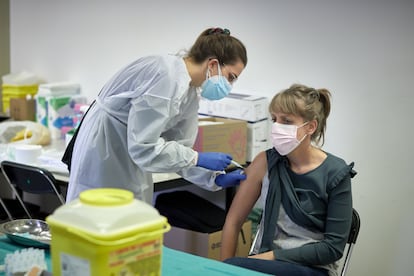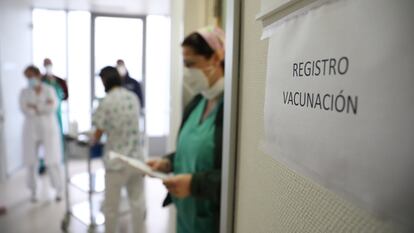Priority groups and vaccines: the latest on Spain’s Covid-19 vaccination drive
An overview of the current state of the campaign, including which inoculations are being used now and in the future, and who will be receiving jabs in the upcoming phases

Three Covid vaccines are currently available in Spain, but they do not have the same directions for use – the Oxford-AstraZeneca vaccine has only been approved for people between the ages of 18 and 55. This means that different priority groups are being vaccinated at the same time, instead of one after the other. In the ongoing phase 1 – which focuses on inoculating residents and staff of care homes, frontline medical workers and all adults with need for daily assistance even if they are not in residential care – essential workers, such as teachers, police and firefighters, have also been added. And this month, some regions will also begin to vaccinate people over the age of 80. Each group overlaps so that the process is not put on hold.
The vaccination protocol is being updated based on the progress of the campaign and the arrival of new vaccines. Here is an overview of what has been decided in the most recent update, dated February 9.
How many people in phase 1 have been vaccinated and how many are left?
Phase 1 of the vaccination drive includes nearly 2.5 million people: 380,000 care home residents, 1.7 million health workers (including care home staff and personnel who look after vulnerable people in their homes) and 367,000 adults with need for daily assistance who are not living in care facilities.
According to the most recent report from the Spanish Health Ministry, 2.2 million doses of the vaccine have been administered and 889,683 people have received the full two doses. There is no official data on how many people have been vaccinated in each of these groups. According to regional authorities – who are in charge of the vaccination drive, as well as the response to the pandemic – the residence phase of the campaign is nearly complete; only some care homes have yet to be vaccinated due to coronavirus outbreaks. Most frontline health workers have received the first dose of the vaccine, and some regions, such as the Canary Islands, Murcia and Navarre, have begun vaccinating adults with need for daily assistance who are not in care facilities. It is expected that the rest of the regions will begin vaccinating this group between this week and the next.
Is Spain vaccinating at a good speed?
The current speed of the vaccination drive is clearly not fast enough to reach the government’s goal of vaccinating 70% of the population by summer. But it cannot go any faster with the number of vaccines that are arriving – every week, the regions administer more than 90% of the doses they receive. A small reserve is typically held back in case of delays or shortages. With the arrival of the AstraZeneca vaccine, the pace has quickened and it will continue to gather speed in the following months: this week nearly one million doses will arrive in Spain, including 228,000 doses of the AstraZeneca vaccine, which are due to be delivered on Thursday.
The Health Ministry is predicting that Spain will be able to reach its goal of vaccinating 70% of the population by summer with the three treatments that have been approved so far: the vaccines from AstraZeneca, Moderna and Pfizer-BioNTech. But a fourth Covid vaccine from US pharmaceutical company Janssen, set to be approved by the European Union on March 8, is also likely to be added. A total of 2.1 million doses will need to be administered every week between spring and summer if the government is to reach its goal. This number will be less if the Janssen vaccine is introduced, as it only requires one dose. Some regions have announced that they will use large spaces such as the WiZink Center in Madrid, a sports and concert arena, and the Camp Nou soccer stadium in Barcelona to administer vaccinations, but this is at odds with the number of doses that are currently available in Spain. As Health Minister Carolina Darias pointed out on Wednesday, the public health system administered the flu vaccine to 14 million people in eight weeks, just a few months ago.

How many doses are set to arrive in the next few months?
The confidentiality of contracts with pharmaceutical companies means that little is known about how many vaccine doses will arrive. According to the Health Ministry, at least 6.5 million doses will arrive by March, with 1.8 million doses from AstraZeneca, 412,000 from Moderna and nearly 1.8 million from Pfizer set to be delivered in February. Pfizer has announced that 2.5 million doses will be sent in March. The other companies have not specified how many vaccines will be delivered in that month.
When will the over-80s be vaccinated?
This depends on each region. Galicia has announced that it will begin to vaccinate people over the age of 80 on February 22. The regions will start vaccinating this age group between the end of February and the beginning of March, before all adults with need for daily assistance who are not living in care facilities have received the jab. There are 2.8 million people in this age group, but this number also includes the senior residents who have been vaccinated in phase 1.
Who will be vaccinated after the over-80s?
The next group will be people aged between 70 and 79, a demographic that comprises nearly four million people. This stage will begin as the vaccination of the over-80s advances, when there are enough doses of the Pfizer and Moderna vaccine for both groups, given the AstraZeneca vaccine is restricted to over-55s.
What about vulnerable people from other age groups?
They must wait. In its revised vaccination strategy, the Health Ministry said that patients with certain pre-existing medical conditions will not, for now, receive the AstraZeneca vaccine. This includes patients with severe immunodepression (including cancer patients undergoing chemotherapy treatment), uncontrolled cardiovascular disease, and severe liver, kidney, metabolic/endocrine or neurological diseases. The basis for this decision was that people with these underlying health conditions were not included in the clinical trials for the vaccine. According to the protocol, people in this category “will be vaccinated at a later date when their age group or risk group comes up, and with the most appropriate vaccine depending on availability and new available evidence.”
People with other comorbidities, such as hypertension, diabetes and obesity, will receive the AstraZeneca vaccine if they are essential workers and under the age of 55.

Which essential workers will receive the AstraZeneca vaccine?
The AstraZeneca vaccine will not be administered to anyone over the age of 55, given that there is not yet sufficient evidence of its efficiency for the older age group. As a result of this decision, the Health Ministry has prioritized a new group to receive the vaccine: essential workers. The AstraZeneca vaccine will be administered to law-enforcement officers from the National Police, the Civil Guard, and regional and local agencies, firefighters, members of the armed forces and prison workers. It will also be given to teachers in early, primary and secondary education, as well as teaching assistants, monitors and tutors. Also included in this group are healthcare professionals who are not considered frontline workers: physiotherapists, occupational therapists, pharmacy office workers, legal medicine workers, home assistance workers, and employees at day centers and centers for minors. According to the Health Ministry, there are 5.3 million essential workers in Spain. This figure includes other groups that have not been prioritized for the AstraZeneca jab, such as legal staff, mail workers and food-production employees. One also has to subtract the number of people over 55 and those with the aforementioned health conditions.
Will people who have had the coronavirus be vaccinated?
The updated protocol recommends against vaccinating people under the age of 55 if they have recently contracted the coronavirus. In this situation, the advice is to wait six months from the date of the positive test result, regardless of whether it is a minor or asymptomatic case. This does not apply to people over the age of 55 or who are at high risk. This new protocol tries to prioritize essential workers, given that the likelihood of reinfection in this period is considered remote, based on what is known so far. The new guidelines, which were approved on Wednesday at a gathering of central and regional health officials known as the Inter-Territorial Council of the National Healthcare System, indicate that if a person contracts the virus after the first doses of the vaccine, they must wait six months before receiving the second.
English version by Melissa Kitson.
Tu suscripción se está usando en otro dispositivo
¿Quieres añadir otro usuario a tu suscripción?
Si continúas leyendo en este dispositivo, no se podrá leer en el otro.
FlechaTu suscripción se está usando en otro dispositivo y solo puedes acceder a EL PAÍS desde un dispositivo a la vez.
Si quieres compartir tu cuenta, cambia tu suscripción a la modalidad Premium, así podrás añadir otro usuario. Cada uno accederá con su propia cuenta de email, lo que os permitirá personalizar vuestra experiencia en EL PAÍS.
¿Tienes una suscripción de empresa? Accede aquí para contratar más cuentas.
En el caso de no saber quién está usando tu cuenta, te recomendamos cambiar tu contraseña aquí.
Si decides continuar compartiendo tu cuenta, este mensaje se mostrará en tu dispositivo y en el de la otra persona que está usando tu cuenta de forma indefinida, afectando a tu experiencia de lectura. Puedes consultar aquí los términos y condiciones de la suscripción digital.









































